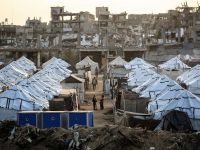Israeli troops on Monday entered PA-controlled areas in the West Bank and the Gaza Strip following a bomb explosion and mortar fire on Jewish settlements, said reports.
Al Jazeera satellite TV channel reported the Israeli tanks entered the territories following claims that Palestinian gunmen fired a mortar shell at the Kfar Darom Jewish settlement. There were no injures in the claimed attack.
In the West Bank, Israeli troops entered the village of Deir Estya in the governorate of Salfit on Monday morning, reported the official Palestinian news agency, WAFA.
It said that Israeli soldiers set up army posts at the entrances of the villages.
In another development, Jewish settlers attacked several Palestinian laborers in the West Bank city of Tulkarem, injuring a Palestinian who received a bullet in the head.
The injured man was identified as Suhail Ebied, a resident of Rafah in the Gaza Strip.
PALESTINIANS SAY FIRING ON ISRAELI TARGETS DOWN 99 PERCENT SINCE CEASEFIRE
Palestinian and Israeli officials are issuing conflicting reports on whether the ceasefire promised by the Palestinian leadership has been correctly implemented.
A senior Palestinian official said Monday that firing on Israeli targets had gone down 99 percent since Palestinian President Yasser Arafat ordered a ceasefire on Saturday, reported AFP.
"Firing on Israeli targets in the West Bank and Gaza Strip has gone down 99 percent in the past two days compared with previous days," the official told AFP in Gaza City, asking not to be named.
But Israeli officials had earlier said the evidence that Arafat was committed to his ceasefire call was "not promising."
"We are giving one more chance for peace at present by seeing whether Mr. Arafat will follow through on his ceasefire commitment," Israeli Prime Minister Ariel Sharon's advisor, Dore Gold, told AFP.
"Right now the evidence is not very promising."
Arafat called for a ceasefire on Saturday night following a suicide bombing in Tel Aviv that killed 20 Israelis, plus the bomber, in the deadliest attack in years.
Gold said there had been a drop in anti-Israeli attacks since then, but highlighted a mortar attack in the Gaza Strip overnight and a roadside bombing in the West Bank earlier Monday.
A bomb exploded at the Jewish settlement of Barkan in the northern West Bank, causing no injuries, reported Israel Radio, cited by Haaretz newspaper.
The pipe bomb went off in front of an Israeli car, leaving the driver in a state of shock, a military spokesman told the radio.
The sector was immediately cordoned off by troops.
Meanwhile, the Israeli army claimed that Palestinian gunners fired a mortar shell at the Gaza Strip settlement of Kfar Darom.
It also claimed that gunmen fired at an Israeli military vehicle near the West Bank town of Tulkarem.
No injuries were reported in either incident, according to the report.
"We have no evidence that Mr. Arafat is re-imprisoning those human time bombs, the operatives of Hamas and Islamic Jihad that have been attacking Israeli population centers over the past two weeks," Gold added.
Asked how long Israel would give Arafat, Gold said: "The government does not like to place fixed deadlines, because in diplomacy that usually turns out to be a boomerang. But security services of Israel together with the Israeli government will ascertain how long the Israeli government can hold back.
"Israel will do what is necessary to defend its people if it ascertains that Mr. Arafat is not serious about following through on its ceasefire," he added.
He repeated Israel's claims that most of the attacks against Israel over the past eight months have come from organizations directly under Arafat's control.
Asked about the flurry of diplomatic missions aimed at ending the uprising, he said: "The international community can contribute a great deal, specifically if it puts pressure on the aggressor, in this case Arafat, to hold back the attacks going on against Israeli cities."
ISRAELI MINISTER: IF ARAFAT DOESN'T ACT SOON, WE'LL HIT THE PA
Israel's cabinet minister, Danny Naveh, said Monday that "if Arafat does take steps soon to curb terror -- including arresting activists of militant Palestinian groups -- Israel will launch attacks against PA targets in the territories."
Naveh told Army Radio that it Arafat should be given a chance to demonstrate that his ceasefire calls are serious, but that the "testing period" could not last long.
"If Arafat does not indeed fight terror, as he has claims he intends to do, the significance of this is that we will have to fight terror," Naveh said.
"Terror is not just Hamas and the Islamic Jihad, but also he who gives a green light to Hamas and the Islamic Jihad, and that is the Palestinian Authority."
On Sunday, Israeli forces were surrounding the Palestinian town of Qalqilya, reported Abu Dhabi satellite channel.
The station's correspondent said that local radios were announcing warnings by the Intifada leadership, urging people not to gather in public areas, and to cooperate with the Palestinian security forces.
Qalqilya is the hometown of Said Hotari, the Hamas suicide bomber who carried out the Tel Aviv bombing on Friday, in which 19 Israelis were killed and some 120 injured.
Meanwhile, Israeli radio warned that strikes had been ordered.
"Our finger is on the trigger to ensure the security of the citizens of Israel," Israeli Defense Minister Binyamin Ben Eliezer warned.
That was highlighted by an Israeli public radio report, saying the government had ordered strikes against Palestinian extremists responsible for most anti-Israeli bombings in recent years, and that the Palestinian Authority itself might also be targeted.
The armed wing of the Palestinian Islamist movement Hamas claimed responsibility for the Friday suicide bombing.
The Ezzeddin al-Qassam Brigades "will continue their martyr (acts) until all our rights are recovered and they announce their determination to avenge all the martyrs and to defend the Al Aqsa mosque and Palestine with their souls," said a statement faxed to AFP.
The report followed meetings chaired by Israeli Prime Minister Ariel Sharon with his inner security cabinet and the full government to weigh the response to Friday night's attack at a beachside nightclub in Tel Aviv that killed 19 young people plus the bomber.
During the meeting, Sharon labeled Arafat's call merely a "tactic" employed because of international pressure and fears of harsh reprisals, Israeli radio reported.
Indeed, a senior Israeli security official told a briefing for foreign reporters on condition of anonymity that Arafat's call averted a harsh Israeli retaliation.
"We were just about to launch a very severe airstrike," he was quoted as saying by AFP, warning however: "But I am sure you will see it will happen, unfortunately, whenever the chairman will decide to go back to terrorism and not to keep the ceasefire."
US Secretary of State Colin Powell said he was encouraged at Sharon's measured response despite pressure to retaliate.
"I am glad that so far he is pacing the response and he is giving the other side, the Palestinian side, time to act on what they said they were going to do...I would encourage him to keep having this measured response," Powell said on NBC's Meet the Press.
Powell, who spoke to both Sharon and Arafat after the Tel Aviv attack, said his message to Arafat was: "This is the time to bring the violence under control."
The United States is leading an international campaign to try to break the cycle of violence that has claimed almost 600 lives since late September, the vast majority of them Palestinians.
But Palestinians and Arab parties accuse the superpower of taking the Israeli side, by ignoring the fact that Israel is occupying Palestinian lands and launching aggression against the residents of the Occupied Territories.
In the West Bank town of Ramallah, Arafat held talks with German Foreign Minister Joschka Fischer to discuss the "details of the implementation of the ceasefire."
Palestinian negotiator Saeb Erakat also appealed on Voice of Palestine radio for US Middle East envoy William Burns to resume efforts to implement the recommendations made by a committee led by former US senator George Mitchell.
And Moscow also sought to step up its role, with Foreign Minister Igor Ivanov making calls to Powell, Arafat and Peres, condemning "criminal acts of terrorism" while calling on Israel to show patience, said the agency.
For their part, a coalition of 13 Palestinian movements, including Hamas and Islamic Jihad, said Sunday they intended to continue the Intifada, after a meeting to discuss Palestinian President Yasser Arafat's ceasefire order, reported AFP.
The various groups, which also included the Fateh faction, stressed in a joint statement "the right of the Palestinian people to defend themselves against aggression, occupation and colonization and continue the Intifada, one of their legitimate rights."
They called on the Palestinians to "continue popular demonstrations to underline the continuation of the Intifada," the revolt against Israeli occupation now in its ninth month, said the statement, cited by AFP.
The coalition, known as the Islamic and Nationalist Forces, had gathered to debate Arafat's ceasefire order.
POLL: 60 PERCENT OF JEWISH ISRAELIS BACK UNILATERAL SEPARATION
A poll released Monday showed that 60 percent of Israelis back unilateral separation from the Palestinians, and 80 percent stated that "there is no guarantee that Arafat and the Palestinians will adhere to a future peace agreement even if one is signed," reported Haaretz newspaper.
The Peace Index poll, taken last month, showed that that "there was a continuing decline in the degree to which Yasser Arafat and the Palestinians are willing to reach a peace agreement with Israel."
"In many respects we are returning to square one, to the pre-Oslo period, and there are indications that the public thinks that the situation is worse that before the peace process began," said Tamar Herman, head of the Steinmetz Center for Peace Studies.
Surprisingly, however, she continued, a majority of Israelis believe that the "society can stand up to the challenges of the current violence than can the Palestinian public."
She added that when Israeli Arabs were polled as to their trust in the Palestinians to keep peace agreements, an equal but opposite 80 percent said they believed the Palestinians would honor the terms of the accords.
The poll has asked about separation since 1995, but with a crucial difference. "In the past, we asked about separation as part of some sort of agreement between the parties, under the formula of 'two states for two peoples.' Here we are asking about unilateral separation, an Israeli withdrawal from part of the territory, without an agreement, and based on solely Israeli interests.
Of the response to the question "Without an agreement, does it appear to you that Israel can leave certain areas on its own initiative?" Herman said "It was rather amazing that 60 percent were willing to agree. She said 77 percent of Meretz voters agreed, with Labor voters behind them. A total of 56 percent of Likud voters also voiced agreement."
Since the outbreak of the latest Israeli-Palestinian conflict last September, Reuters reports that Palestinians have killed approximately 88 Israelis with weapons ranging from stones and knives to machineguns and car bombs. The latest suicide bombing raises that toll by 20. Israeli military sources have reported over 600 injuries to Israelis of Jewish descent.
In the same time period, according to CNN, Israeli soldiers and armed Jewish settlers have killed 13 Arab Israelis and 450 Palestinians with weapons ranging from machineguns and tanks to US-made Apache helicopter gunships and F-16s.
The Palestinian Red Crescent Society has reported over 14,000 Palestinians wounded.
Jewish author Noam Chomsky, who according to a New York Times Book Review article is “arguably the most important intellectual alive,” has been quoted as saying: “State terrorism is an extreme form of terrorism, generally much worse than individual terrorism because it has the resources of a state behind it.” - Albawaba.com
© 2001 Al Bawaba (www.albawaba.com)







